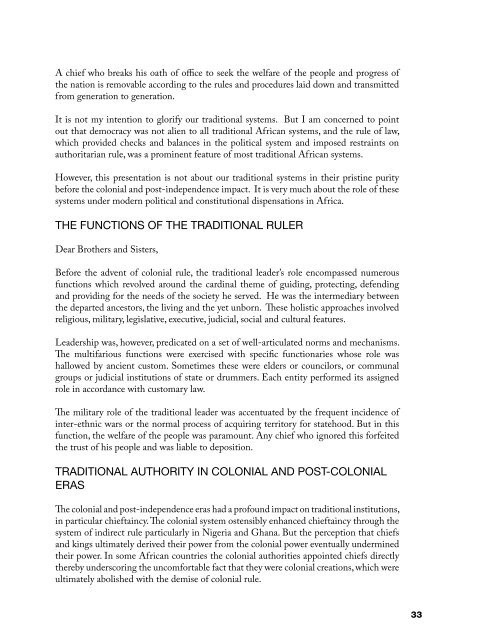Relevance of - United Nations Economic Commission for Africa
Relevance of - United Nations Economic Commission for Africa
Relevance of - United Nations Economic Commission for Africa
You also want an ePaper? Increase the reach of your titles
YUMPU automatically turns print PDFs into web optimized ePapers that Google loves.
A chief who breaks his oath <strong>of</strong> <strong>of</strong>fice to seek the welfare <strong>of</strong> the people and progress <strong>of</strong><br />
the nation is removable according to the rules and procedures laid down and transmitted<br />
from generation to generation.<br />
It is not my intention to glorify our traditional systems. But I am concerned to point<br />
out that democracy was not alien to all traditional <strong>Africa</strong>n systems, and the rule <strong>of</strong> law,<br />
which provided checks and balances in the political system and imposed restraints on<br />
authoritarian rule, was a prominent feature <strong>of</strong> most traditional <strong>Africa</strong>n systems.<br />
However, this presentation is not about our traditional systems in their pristine purity<br />
be<strong>for</strong>e the colonial and post-independence impact. It is very much about the role <strong>of</strong> these<br />
systems under modern political and constitutional dispensations in <strong>Africa</strong>.<br />
THE FUNCTIONS OF THE TRADITIONAL RULER<br />
Dear Brothers and Sisters,<br />
Be<strong>for</strong>e the advent <strong>of</strong> colonial rule, the traditional leader’s role encompassed numerous<br />
functions which revolved around the cardinal theme <strong>of</strong> guiding, protecting, defending<br />
and providing <strong>for</strong> the needs <strong>of</strong> the society he served. He was the intermediary between<br />
the departed ancestors, the living and the yet unborn. These holistic approaches involved<br />
religious, military, legislative, executive, judicial, social and cultural features.<br />
Leadership was, however, predicated on a set <strong>of</strong> well-articulated norms and mechanisms.<br />
The multifarious functions were exercised with specific functionaries whose role was<br />
hallowed by ancient custom. Sometimes these were elders or councilors, or communal<br />
groups or judicial institutions <strong>of</strong> state or drummers. Each entity per<strong>for</strong>med its assigned<br />
role in accordance with customary law.<br />
The military role <strong>of</strong> the traditional leader was accentuated by the frequent incidence <strong>of</strong><br />
inter-ethnic wars or the normal process <strong>of</strong> acquiring territory <strong>for</strong> statehood. But in this<br />
function, the welfare <strong>of</strong> the people was paramount. Any chief who ignored this <strong>for</strong>feited<br />
the trust <strong>of</strong> his people and was liable to deposition.<br />
TRADITIONAL AUTHORITY IN COLONIAL AND POST-COLONIAL<br />
ERAS<br />
The colonial and post-independence eras had a pr<strong>of</strong>ound impact on traditional institutions,<br />
in particular chieftaincy. The colonial system ostensibly enhanced chieftaincy through the<br />
system <strong>of</strong> indirect rule particularly in Nigeria and Ghana. But the perception that chiefs<br />
and kings ultimately derived their power from the colonial power eventually undermined<br />
their power. In some <strong>Africa</strong>n countries the colonial authorities appointed chiefs directly<br />
thereby underscoring the uncom<strong>for</strong>table fact that they were colonial creations, which were<br />
ultimately abolished with the demise <strong>of</strong> colonial rule.<br />
33
















